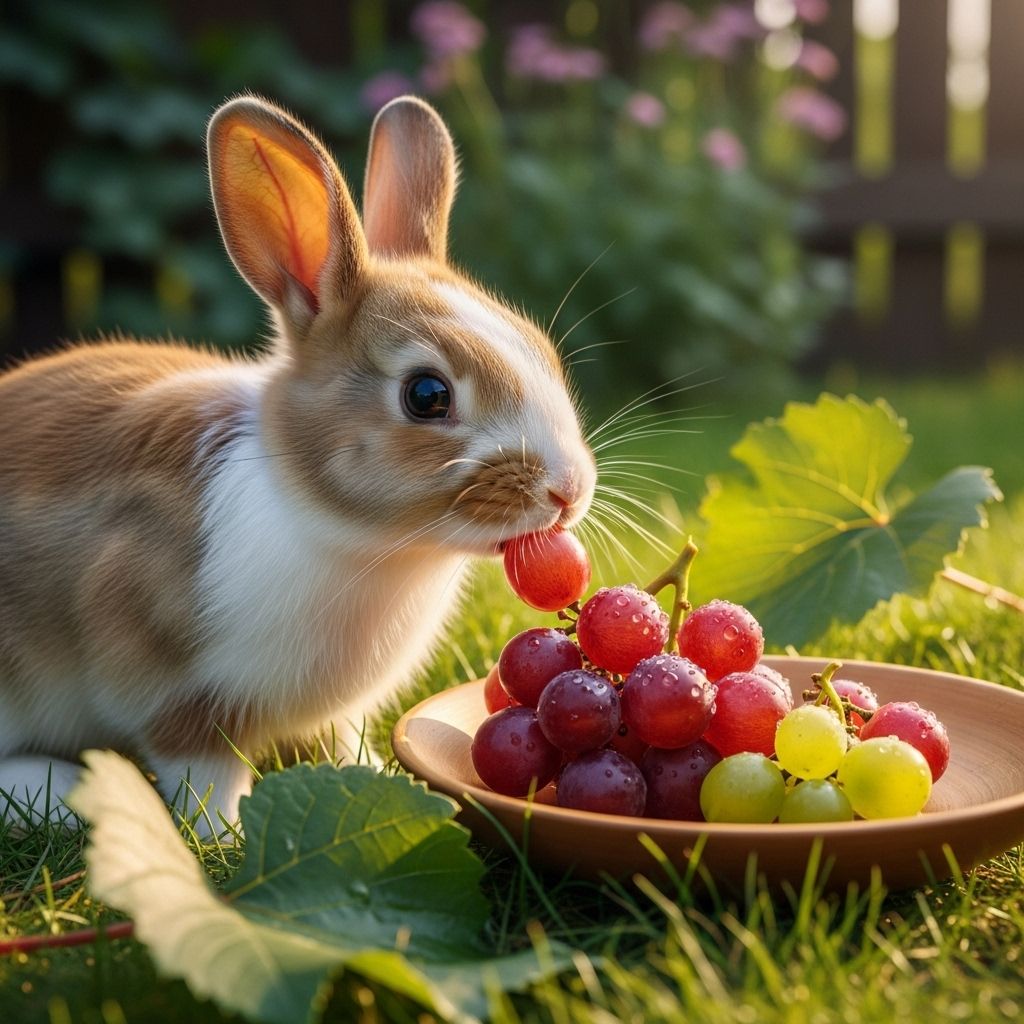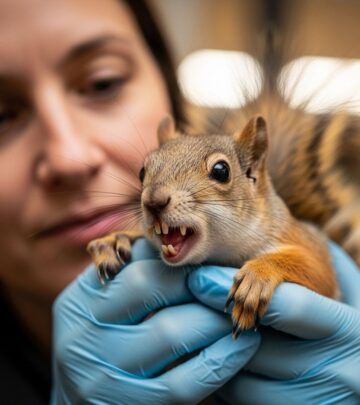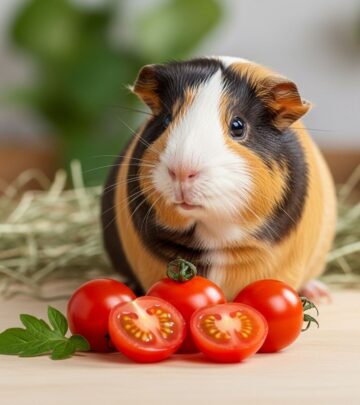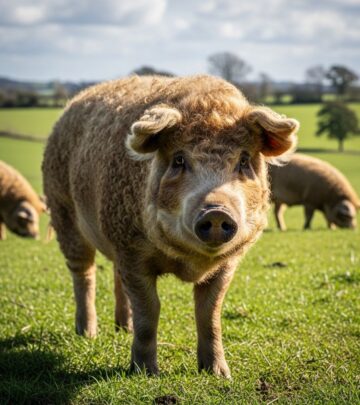Can Rabbits Eat Grapes? 5 Nutritional Benefits And Safe Tips
Everything rabbit owners need to know about giving grapes—nutrition, safety guidelines, best practices, and common questions.

Image: HearthJunction Design Team
Can Rabbits Eat Grapes? What Every Owner Should Know
Rabbits are beloved pets with a reputation for enjoying fresh produce, but when it comes to offering sweet fruits like grapes, many owners wonder: Are grapes safe for rabbits? The answer is yes—rabbits can eat grapes in moderation. However, there are important considerations, from proper serving sizes to potential health risks, to ensure your bunny enjoys this treat safely. This comprehensive guide breaks down everything you need to know about feeding grapes to rabbits, including nutritional benefits, safe feeding practices, and answers to the most common questions.
Are Grapes Safe For Rabbits?
Unlike some household pets—like dogs and cats, who should never eat grapes—rabbits can safely enjoy this fruit. Grapes do not contain compounds that are toxic to rabbits. In fact, these vegan critters can digest plant-based compounds, such as tannins found in grapes, with ease. Nevertheless, grapes should only be offered as an occasional treat rather than a staple of your rabbit’s diet, given their high sugar content and potential impact on digestive health .
Nutritional Benefits of Grapes for Rabbits
Grapes deliver a range of beneficial vitamins and minerals, which can offer some health advantages to rabbits when fed appropriately:
- Vitamin C – Supports immune system health and overall well-being .
- Vitamin K – Important for blood clotting and bone health .
- Potassium – Helps support proper heart and muscle function .
- Antioxidants – Fights free radicals and strengthens the immune system .
- B Vitamins & Magnesium – Support metabolic and nerve health .
While grapes do add these nutrients, they are not necessary for a rabbit’s overall nutrition and should not replace their primary dietary staples. The majority of a rabbit’s diet should consist of unlimited hay, a portion of high-quality pellets, and plenty of leafy greens .
Grape Nutritional Facts (Per 100g)
| Nutrient | Amount |
|---|---|
| Sodium | 2 mg |
| Potassium | 191 mg |
| Carbohydrate | 17 g |
| Fibre | 0.9 g |
| Sugar | 16 g |
| Protein | 0.6 g |
| Vitamins | C, K, B6 |
| Minerals | Iron, Magnesium, Calcium |
Despite their health benefits, grapes are high in natural sugar (up to 16g per 100g), making portion control essential to prevent digestive upset or obesity in rabbits .
How Many Grapes Can a Rabbit Eat?
When feeding grapes to rabbits, less is more. Due to their high sugar content, grapes are best reserved as a rare treat. Excess sugar can upset a rabbit’s digestive system, leading to diarrhea, bloating, or even obesity .
- Adult rabbits: 1–2 grapes, offered no more than once or twice per week .
- Young rabbits (6–12 months): Up to 1–2 grapes per week, with careful monitoring for digestive sensitivity .
- Baby rabbits (<6 months): Should not be given grapes, as their digestive systems are too delicate .
Tips for safe feeding:
- Wash grapes thoroughly to remove pesticides and harmful residues .
- Opt for organic grapes when possible.
- Chop grapes into halves or quarters for small rabbits to avoid choking hazards .
- Always supervise your rabbit during treat time.
Seedless vs. Seeded Grapes: Which Should You Choose?
Seedless grapes are the safest option for rabbits. While grape seeds are not considered highly toxic, they can be difficult for rabbits to digest and may present a choking risk . If only seeded grapes are available, remove all seeds before offering any grape pieces to your bunny.
Are Grape Skins and Stems Safe for Rabbits?
Rabbits can eat grape skin, which is where many of the fruit’s nutrients reside, such as vitamin K and antioxidants . However, always make sure the skins are free from chemical residues by washing them well. Avoid offering grape stems, as they are fibrous and can be difficult for rabbits to chew or digest.
Can Rabbits Eat Grape Leaves?
Grape leaves are not commonly found in most homes but are sometimes available to those who grow grapes. While some foraging guides suggest rabbits can nibble small amounts of pesticide-free, organic grape leaves, always introduce any new part of a plant in tiny amounts and monitor for digestive upset. When in doubt, stick to fruits and greens known to be safe for rabbits.
What Are the Risks of Feeding Grapes to Rabbits?
Though grapes are non-toxic, overfeeding can result in several health problems for rabbits:
- Digestive upset: Too much sugar can unbalance the gut flora, leading to diarrhea, gas, or even life-threatening GI stasis .
- Obesity: Excessive caloric intake from sugary treats can lead to unhealthy weight gain.
- Dental health issues: Sticky, sugary foods can contribute to dental problems if overconsumed.
- Preference for sweet foods: Frequent treats may make rabbits picky, causing them to avoid their essential, fiber-rich hay and leafy greens.
- Pesticide ingestion: Non-organic grapes can contain pesticide residues on the skin, which may be harmful to rabbits .
Ensuring moderation and careful preparation will allow your rabbit to enjoy grapes safely and healthily.
How to Introduce Grapes to a Rabbit’s Diet
- Start Small: Offer just a half or a quarter of a grape the first time to observe your rabbit’s reaction.
- Watch Closely: Monitor for any signs of digestive discomfort—such as soft stool, decreased appetite, or lethargy—within 24 hours of introducing grapes.
- Gradually Increase: If your rabbit handles this treat well, you can slowly work up to the recommended serving size over several weeks.
Always keep treats like grapes to less than 5% of your rabbit’s total weekly food intake.
Best Alternatives to Grapes for Rabbits
If you’re looking for variety in treats or your rabbit shows signs of sensitivity to grapes, there are plenty of other rabbit-safe snacks to choose from:
- Berries (strawberries, blueberries, raspberries)
- Sliced apple (without seeds)
- Papaya
- Banana (sparingly)
- Dandelion greens
- Fresh herbs (parsley, cilantro, dill)
Remember to follow similar moderation guidelines for any fruit treat.
FAQs: Rabbits and Grapes
Q: Are grapes poisonous to rabbits?
A: No, grapes are not toxic to rabbits. However, they should only be offered occasionally and in small quantities due to their sugar content .
Q: Can rabbits eat grape seeds?
A: While not highly toxic, grape seeds can pose a choking risk and be difficult to digest. Always offer seedless grapes or carefully remove seeds before feeding .
Q: Are raisins (dried grapes) safe for rabbits?
A: Raisins should be avoided as treats for rabbits. The drying process concentrates the sugar, making raisins much higher in calories and sweeter than fresh grapes, increasing the risk of digestive upset and obesity even further.
Q: What is the healthiest treat for rabbits?
A: The healthiest treats are high-fiber leafy greens and herbs. Fruits like grapes should be limited to ensure a balanced diet and healthy digestive system.
Q: Can I feed grapes to a baby rabbit?
A: No, baby rabbits (under 6 months) should not have grapes or other fruits. Their digestive systems are too sensitive to handle sugars .
Summary Table: Grapes and Rabbits
| Feature | Recommendation |
|---|---|
| Are grapes safe? | Yes, in moderation |
| Serving size | 1–2 grapes, 1–2x/week |
| Seedless or seeded? | Seedless preferred; remove seeds if needed |
| Grape skins? | Yes, well-washed |
| Grape leaves? | Only organic, pesticide-free, and in tiny amounts |
| For baby rabbits? | No |
Final Thoughts: Enjoy Grapes—But Sparingly!
Grapes can be a delightful and nutritious treat for rabbits when served properly. While most bunnies love their juicy sweetness, keeping servings small and infrequent is key to preventing health issues. Always wash grapes thoroughly, choose seedless varieties, and avoid offering them to young or sensitive rabbits. By following these guidelines, you can safely share a sweet moment with your furry companion.
More Rabbit Feeding Tips
- Prioritize unlimited hay (timothy, orchard, or meadow) for fiber and dental health.
- Offer a daily mix of rabbit-safe greens, such as romaine, bok choy, and cilantro.
- Introduce any new foods—including grapes—one at a time and slowly.
- Fresh, clean water should always be available.
- Consult your veterinarian before making significant diet changes, especially for rabbits with health conditions.
References
- Keystone Animal Hospital: Can Rabbits Eat Grapes?
- Chewy.com: Can Rabbits Eat Grapes?
- A-Z Animals: Yes, Rabbits Can Eat Grapes! But Follow These 8 Tips
- Feed My Paws: Can rabbits eat grapes?
References
- https://keystoneah.com/blog/can-rabbits-eat-grapes/
- https://www.chewy.com/education/small-pet/rabbit/can-rabbits-eat-grapes
- https://a-z-animals.com/blog/yes-rabbits-can-eat-grapes-but-follow-these-tips/
- https://binkybunny.com/forums/topic/the-great-grape-debate/
- https://www.feedmypaws.com/blogs/pet-diet-talk/can-rabbits-eat-grapes-1
Read full bio of Shinta












